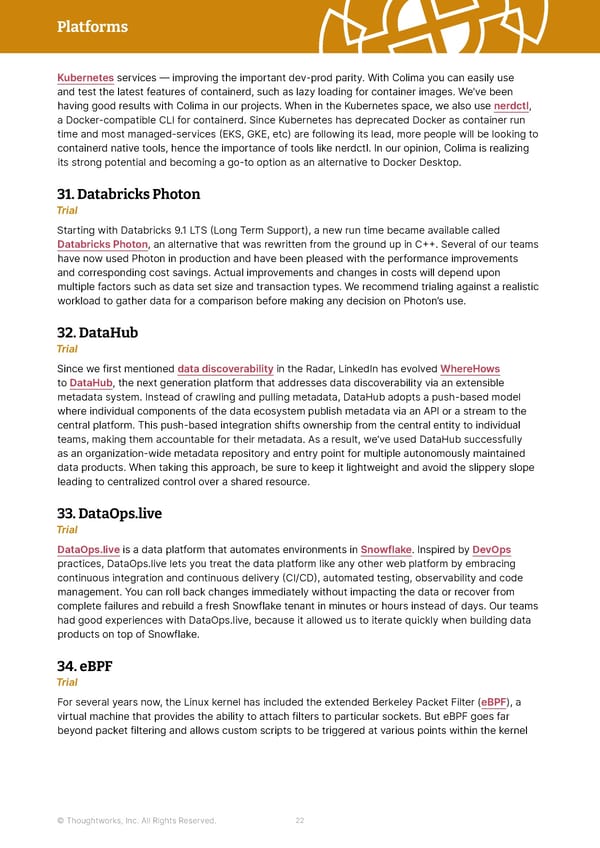Platforms Thoughtworks Technology Radar Kubernetes services — improving the important dev-prod parity. With Colima you can easily use and test the latest features of containerd, such as lazy loading for container images. We’ve been having good results with Colima in our projects. When in the Kubernetes space, we also use nerdctl, a Docker-compatible CLI for containerd. Since Kubernetes has deprecated Docker as container run time and most managed-services (EKS, GKE, etc) are following its lead, more people will be looking to containerd native tools, hence the importance of tools like nerdctl. In our opinion, Colima is realizing its strong potential and becoming a go-to option as an alternative to Docker Desktop. 31. Databricks Photon Trial Starting with Databricks 9.1 LTS (Long Term Support), a new run time became available called Databricks Photon, an alternative that was rewritten from the ground up in C++. Several of our teams have now used Photon in production and have been pleased with the performance improvements and corresponding cost savings. Actual improvements and changes in costs will depend upon multiple factors such as data set size and transaction types. We recommend trialing against a realistic workload to gather data for a comparison before making any decision on Photon’s use. 32. DataHub Trial Since we first mentioned data discoverability in the Radar, LinkedIn has evolved WhereHows to DataHub, the next generation platform that addresses data discoverability via an extensible metadata system. Instead of crawling and pulling metadata, DataHub adopts a push-based model where individual components of the data ecosystem publish metadata via an API or a stream to the central platform. This push-based integration shifts ownership from the central entity to individual teams, making them accountable for their metadata. As a result, we’ve used DataHub successfully as an organization-wide metadata repository and entry point for multiple autonomously maintained data products. When taking this approach, be sure to keep it lightweight and avoid the slippery slope leading to centralized control over a shared resource. 33. DataOps.live Trial DataOps.live is a data platform that automates environments in Snowflake. Inspired by DevOps practices, DataOps.live lets you treat the data platform like any other web platform by embracing continuous integration and continuous delivery (CI/CD), automated testing, observability and code management. You can roll back changes immediately without impacting the data or recover from complete failures and rebuild a fresh Snowflake tenant in minutes or hours instead of days. Our teams had good experiences with DataOps.live, because it allowed us to iterate quickly when building data products on top of Snowflake. 34. eBPF Trial For several years now, the Linux kernel has included the extended Berkeley Packet Filter (eBPF), a virtual machine that provides the ability to attach filters to particular sockets. But eBPF goes far beyond packet filtering and allows custom scripts to be triggered at various points within the kernel © Thoughtworks, Inc. All Rights Reserved. 22
 Vol 27 | Technology Radar Page 21 Page 23
Vol 27 | Technology Radar Page 21 Page 23